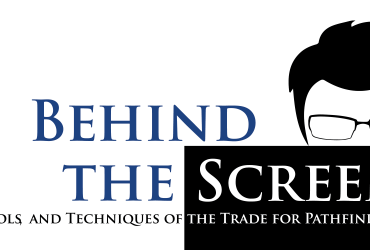Welcome to Guidance, Private Sanctuary’s source for tips and techniques for the Pathfinder Roleplaying Game, written by Everyman Gamer Alexander Augunas. Today, we’re going to be talking a bit about consumer entitlement.
Hey, everyone!
So I’ve just gotten home from the Four Best Days of Gaming, my second trip. Going to GenCon is an experience—tens of thousands of people from across the world, all coming together to share in what they love most. Gaming. We and people like us flood the streets of Indianapolis. We drastically shift their city’s economy while we’re there. Every shop has signs in the window welcoming us. Everything is interconnected—you can walk from the ballroom across a series of skyways to a mall if you want to. That is, without a doubt, one of the coolest things that I’ve ever seen.
GenCon is awesome, but both times I’ve gone to GenCon I’ve been reminded about a relatively ugly side of our hobby. It’s not really a “gaming” problem so much as it is a “Tabletop RPG problem,” and you don’t don’t need to go to GenCon to see it. This particular problem is one that most players and GMs don’t really know exists, but ask anyone who’s actually in the industry (especially sales) and I guarantee that they will wholeheartedly agree with me on this.
Our hobby has a heavy case of consumeristic entitlement.
What Is Consumeristic Entitlement?
About a year ago, I was perusing the Paizo forums, reading product threads like I enjoy doing. I popped into the Inner Sea Races thread, and was reading through a few posts. Inner Sea Races isn’t a product that I was working on, but I nevertheless enjoy keeping up with discussions. One thing that came up several times in the discussion, however, was the topic of price. Specifically, the cost of the PDF version of the product.
“What?! The PDF version of this product is $31.99?” countless people replied. “That can’t be correct. Is that a mistake? Why would I want to pay $31.99 for a 256-page PDF when I can buy Ultimate Campaign’s PDF for only $10? This is an outrage! Its overpriced!”
Except…it isn’t. Conventional printing industry wisdom is that you should charge about 60% of your print product’s cost for your PDFs. This is precisely what Paizo does for nearly all of its product lines—$31.99 for Inner Sea Races is roughly 60% of its $49.99 listed price, while $7.99 for a Player Companion PDF is roughly 60% of their $12.99 listed price. Its roughly the formula that I use for my Everyman Gaming products, that Owen uses for his Rogue Genius Games products, and Jeremy uses for his Dreamscarred Press products. Yet products such as these are almost ALWAYS lamented as being overpriced, if not by words, then by a lack of spending. Naturally this doesn’t apply to everyone, but the majority of Tabletop Gamers don’t really want to pay people in the industry what their products are worth.
And as I mentioned, this isn’t really a “gamer” problem.
Products in Other, Related Industries
I used to play Warhammer Fantasy. Its an awesome game where you paint your miniatures, build armies, and fight in tactical scenarios. There’s a VERY good chance that you’ve heard of this game, or its sister game, Warhammer 40K. Both games are international phenomenons that have spawned multimedia franchises, such as Warhammer Fantasty’s recent mashup with Total War.
Another interesting thing to note about these franchises is that their flagship product, the miniatures themselves, have undergone several price hikes within the past five years alone. When I started playing back in 2010, your softcover splatbook for your armor cost maybe $20. Five years later, when my army was updated for the latest edition of the game, they made the book hardcover, used full-cover pictures, and bumped the price up to $40 to $50. Based on hardcover costs for a book of those sizes, there was a definite price hike of about $15 that was a direct result in quality of the book’s appearance, rather than quality or quantity of the content. And people seem to be mostly okay with that.
The topic of video games when we’re dealing with consumer entitlement is an interesting case, because they seem to be largely in the same boat as Tabletop Games. A game like The Legend of Zelda cost $49.99 back when it first game out in the late 80s, and you can pick up the newest Legend of Zelda game for roughly $59.99 today. Likewise, you could buy the classic Pokemon Red for $29.99 in 1995, and today Pokemon X costs about $32.99. Video games haven’t seen substantial price hikes either, but for whatever reason no one bats an eye in that rare moment that a video game’s price goes up.
But Paizo, of course, gets flack for raising prices their products by $2.00.
Is the Problem Us?
I’m super interested by the fact that Video Games haven’t increased in price much over the past 30 years. If I had to take a gander, its probably why we see the video game dynamic that we do today—the studio that collapses when one big Triple A game comes out and doesn’t preform to par. Maybe we as a community aren’t willing to take risks—when we’re invested in a game, we seem more than willing to invest in said game. For example, when we like a game such as Fallout 4, we’re more than willing to spend $50 to $100 on additional content for that game. In mobile games like Pokemon GO, people are willing to pay extra money for slight conveniences in the game, and encourage doing so as a “way to support,” the game. Subscribes to World of Warcraft are willing to pay monthly for their game and the never ending stream of updates for it. When you have a game you like, you’re usually willing to pay more into it to make it better.
So why is paying extra money for new products in Pathfinder such an issue? I mean, I get it when we’re talking about Third-Party stuff, especially newer 3PPs. But shouldn’t Paizo be more of a, “Let me buy this to help out the company who makes the things I like for my game?” And you never, NEVER hear other people talking about bloat in video games like World of Warcraft or Pokemon.
I don’t really know what we can do to improve this, or how that would even be possible. I think that eventually, we as a gaming community are going to have to be willing to pay more for the things we love. Our companies won’t be able sustain themselves on rates from the 70s any more then we can sustain ourselves on a minimum wage from the 70s. Something’s going to have to give.
Alexander “Alex” Augunas has been playing roleplaying games since 2007, which isn’t nearly as long as 90% of his colleagues. Alexander is an active freelancer for the Pathfinder Roleplaying Game and is best known as the author of the Pact Magic Unbound series by Radiance House. Alex is the owner of Everyman Gaming, LLC and is often stylized as the Everyman Gamer in honor of Guidance’s original home. Alex also cohosts the Private Sanctuary Podcast, along with fellow blogger Anthony Li, and you can follow their exploits on Facebook in the 3.5 Private Sanctuary Group, or on Alex’s Twitter, @AlJAug.







As I say to my non gaming friends. A core rule book and bestiary will run you about 120 dollars in Australia. That is about two to three trips to the movies if you include drinks and snacks, and I will get a lot more than 5 hours out of my 120 dollars.
I know this is a very delayed response, and I’m not sure it will even be seen, but I need to disagree with this pricing model. When I buy a dead tree product I own it, when I buy a PDFs I am buying a license for use. With a book,mI can loan it to a friend, I can give it as a gift, and when I am finished with it, I can sell it to someone else. This is because I own it. A PDFs license allows me to read it without actually owning anything. I think this degree of difference is important, and I value ownership nearly as much as I value the convenience of pdf’s. As such, I maintain the PDFs products are overpriced. This is why I tend to wait for the Paizo summer sale to buy them.